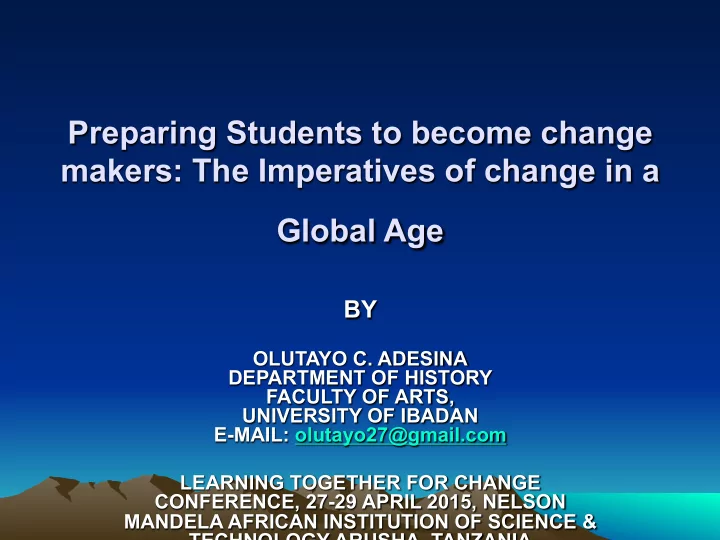

Preparing Students to become change makers: The Imperatives of change in a Global Age BY OLUTAYO C. ADESINA DEPARTMENT OF HISTORY FACULTY OF ARTS, UNIVERSITY OF IBADAN E-MAIL: olutayo27@gmail.com LEARNING TOGETHER FOR CHANGE CONFERENCE, 27-29 APRIL 2015, NELSON MANDELA AFRICAN INSTITUTION OF SCIENCE & TECHNOLOGY ARUSHA, TANZANIA
PREAMBLE • Understanding the socio-economic and institutional contexts in which we operate. • The concerns and aspirations of different ages. • The sorts of pressures which young educated Africans face and their interpretations of the world. • Bridging the gap between aspirations, values and a future order. • Reconciling plans to local realities and situation.
EXTANT PRINCIPLES (1) • It’s really important you build a baseline of skills on which you can build the rest of your career. And I think the other thing to keep in mind is it’s no longer that you’re pigeonholed as narrowly as perhaps a generation or two ago,” says Pritzker. “There’s the opportunity to reskill throughout life, through online learning, through various courses offered at universities, through graduate programs. So what you want to do is make sure that your baseline is really strong of skills so that you can build upon that throughout life. Whether that’s a technical baseline, whether that’s a liberal-arts baseline, you want to make sure that you put that in place. And then be a lifelong learner.” • “One of the things that is really important for us to be doing is making sure that we’re training people for the jobs that exist today,” U.S. Secretary of Commerce Penny Pritzker • http://news.yahoo.com/u-s-secretary-of-commerce-penny-pritzker-talks-to- katie-couric-184604831.html
EXTANT PRINCIPLES (2) • 1. The management of education in Nigeria today requires all citizens to contribute their quota, so that we can have minds that are not only literate but that can maturely grasp the issues that define contemporary reality … ”General Yakubu Gowon[i] • [i] Emeka Chukwuemeka, “Why we fought Biafra, by Gowon”, The Nation, (Lagos), Thursday, April 16, 2015, p.31. • 2. The quality of education is improving. Nigerian education is one of the best in Africa and even in the world. We probably need to pay more attention to the practical aspect of what we are teaching.”[2] • [2] Success Nwogu, “Buhari government should not tolerate cultism – Unilorin VC.” The Punch, Tuesday, April 7, 2015, p. 49.
THE REALITIES AND CHALLENGES OF DOUBLE- CONSCIOUSNESS • The African as a child of two worlds: the encounters between Western and African cultures, beliefs and values. • How do we begin to address the gap between the idea of what we are and what others assume we are or should be? • How is life in Africa structured by need and demand? • Comprehending location and dislocation? • Giving meaning to aspirations. • Endemic corruption of society and the money motive. • The need to restore cosmological balance through an educational process anchored on the culture of the people. • Implications for Africa’s educational system.
SELF-AFFIRMATION • Self affirmation and Cultural Values • How do you connect with Africans/Nigerians, especially young people? • White Collar jobs: Less than favourable preconceptions of skilled employment – notions which derived from the hangover of the colonial experience. • Anecdotal evidence from the post-colonial societies indicate that White Collar jobs are more popular than jobs in sectors critical for growth (agriculture, power, small enterprises). • Revering of money as the single most important criterion of social ranking. • Money rewards as important criterion in comparative ranking of occupations. • Hankering after status symbols.
THE UNIVERSITY/HIGHER EDUCATION IDEA The guidelines and parameters guiding membership of the university system are clear and unambiguous: 1. the university exists to serve the community and the nation; 2. provide the best education to students; 3. impart requisite knowledge, skills, and attitudes; 4. promote civic engagement; 5. build and maintain a strong bond of partnership among academic staff, students, and the administration; and, 6. promote a culture of academic freedom, including freedom of thought and religion What are the implications of the foregoing for the future of higher education in Africa? Are African Universities bare imitators or mechanisms of liberation and development?
THE UNIVERSITY/HIGHER EDUCATION IDEA (2) • Eric Ashby in his Investment in Education (1974) in defining Universities as ‘results of heredity and environment’ had criticized universities in Africa as transplants from Europe that are not doing too well because “the strains planted were not the most suitable.” He then prescribed their cross-breeding with American types, to improve their performance and improve their adaptation to the African environment. • The World Bank in a 1987 report had been critical of the performance of the African University that had shown high promise in the 1970s. • It had pointed out that not only have the universities shown signs of deterioration but were “no longer well suited to the requirements for development.” • World Bank, Educational Policies for sub-Saharan Africa: Adjustment, Revitalization and Expansion, 2 vols , 1987
THINKING OUT OF THE BOX • There is the need to retool the mechanisms by which African societies in the modern world generate the knowledge and innovation which African peoples need for survival and sustenance. • Attack the values first : the value that believes in getting rich quick and certain occupations being short-cuts to power, wealth and privilege. • Encourage hands-on experience • Reinstate community education and citizen involvement. This can serve as catalyst for bringing resources to bear on community problems • Encourage volunteerism in higher institutions as a tool of engendering the resocialization of society.
Recommend
More recommend